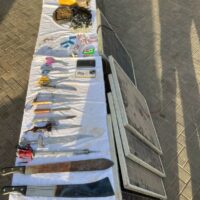The story of Osun election: And the lessons for the future
The story of Osun election: And the lessons for the future
Saturday, November 8, 2014 7:04 am
On the eve of the election, there was total clampdown on the people. Hundreds of leaders and members of APC, loyal supporters of Ogbeni and members of the electorate were arrested by the combined contingents of soldiers, policemen, SSS and NSCDC officials. Knowing that the usual practice of the Inspector General of Police of declaring curfew whenever an election would be held was illegal , this time the Federal Government or the IG made no express declaration of curfew in the State of Osun but the manner in which human and vehicular traffic and activities were shut down by the security forces of PDP was a complete coup detat against popular democracy. Close to eight hundred members of APC were clamped in detention overnight between the 8th and 9th October, 2014. They were held all through the election period on the 9th day of August, 2014 without being allowed to exercise their right to vote.
The rampaging dogs of terror spared no effort and had no respect for anyone. While Alhaji Lai Mohammed had to be taught “when to sleep” by the SSS as he was arrested on his way to the Government House, Oke Fia, Osogbo on the night of the 8th October and was seriously manhandled by some illiterate PDP members who were leading the soldiers to arrest APC leaders and members, the Attorney General and Commissioner for Justice of the State of Osun, Mr. Wale Afolabi, did not know that there was already a coup without martial music as he was also arrested and detained for several hours overnight. The Commissioner for Agriculture, Mr. Wale Adedoyin was arrested while the PDP thugs and soldiers invaded the premises of Senator Bayo Salami and the Chairman of Osogbo Local Government, shooting sporadically to threaten them into submission. Scores of other leaders and government officials suffered similar fates in the hands of these agents of backwardness.
Various degrees of injuries were inflicted on the members of APC arrested by the lawless men in uniform. The PDP thugs used the opportunity to re-introduce their reign of terror which they incontinently practised in between 2007 and 2010 and the height of it all was when they invaded the Government House in Osogbo without any justifiable reason whatsoever in the early hours of the 9th day of August, 2014. They were promptly resisted by the courageous Governor who had instructed that no armed personnel must be allowed entry into the premises save and except upon his permission. The only option left was for the Federal Government to be ready to fight its way into the State Government House and probably the federal government would have won a medal for being the first civilian government to kill a civilian governor while in office. The message was clear and there was immediate retreat by the agents of darkness.
The Unconstitutionality of Militarisation of Electoral Process
It is our position that the use of military men to conduct elections is completely unconstitutional. It is the apogee of lawlessness and the zenith of impunity for any president to deploy soldiers to monitor or conduct elections in Nigeria. Political jobbers and profiteers may fail to read the Constitution appropriately, but it is certain that the provision of section 217 of the 1999 Constitution which establishes the armed forces of the Federation has a mission for its establishment as it provides as follows:
“217.-(1) There shall be an armed forces for the Federation which shall consist of an Army, a Navy, an Air Force and such other branches of the armed forces of the Federation as may be established by an Act of the National Assembly.
(2) The Federation shall, subject to an Act of the National Assembly made in that behalf, equip and maintain the armed forces as may be considered adequate and effective for the purpose of –
(a) defending Nigeria from external aggression;
(b) maintaining its territorial integrity and securing its borders from violation on land, sea or air;
(c) suppressing insurrection and acting in aid of civil authorities to restore order when called upon to do so by the President, but subtract to such conditions as may be prescribed by an Act of the National Assembly; and
(d) performing such other functions as may be prescribed by an Act of the National Assembly.
(3) The composition of the officer corps and other ranks of the armed forces of the Federation shall reflect the federal character of Nigeria.”

 3 hours ago
3 hours ago  5 hours ago
5 hours ago  6 hours ago
6 hours ago  6 hours ago
6 hours ago  8 hours ago
8 hours ago  10 hours ago
10 hours ago  24 hours ago
24 hours ago  1 day ago
1 day ago
Join The Conversation